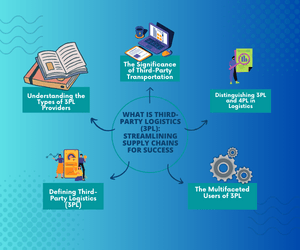What is Third-Party Logistics (3PL): In the complex world of modern business operations, efficiency, and effectiveness are paramount.
As companies seek ways to enhance their operations without compromising quality or incurring excessive costs, the concept of Third-Party Logistics (3PL) has emerged as a game-changer. In this blog post, we’ll dive deep into the realm of 3PL, exploring its definition, types, benefits, and reasons why companies opt for this innovative solution.
Defining Third-Party Logistics (3PL)
At its core, Third-Party Logistics (3PL) is the strategic practice of outsourcing specific aspects of logistics operations to external service providers. These providers specialize in key logistics functions, such as transportation, warehousing, distribution, and even value-added services like packaging and security systems. By leveraging the expertise of these specialized partners, companies can achieve streamlined operations, reduced costs, and improved customer satisfaction.
Understanding the Types of 3PL Providers
There are four primary categories of 3PL providers, each catering to different logistical needs:
- Standard 3PL Provider: Offering fundamental logistics services like warehousing, shipping, and delivery, these providers serve as the basic foundation for outsourcing logistics operations.
- Service Developer: These 3PL providers focus on adding value through specialized services like advanced tracking, unique packaging solutions, and security systems. Technology-driven and efficient, they provide a competitive edge to their clients.
- Customer Adapter: When companies seek complete control delegation of their logistics operations, customer adapter 3PL providers step in. Their expertise lies in optimizing existing operations, leading to significant improvements.
- Customer Developer: At the highest tier, customer developer 3PL providers not only take over complete logistics but also restructure and optimize workflows as needed, driving long-term efficiency gains.
The Significance of Third-Party Transportation
Third-party transportation is a critical subset of 3PL, where transportation operations are outsourced to specialized providers. These providers possess the necessary expertise and resources to efficiently manage transportation, which could include partial or full handling of the shipping and delivery process. The specifics of the arrangement are defined by the contract between the client and the third-party provider.
Distinguishing 3PL and 4PL in Logistics
While both 3PL and 4PL offer logistical support, they differ in their scope and focus. A 3PL provider typically manages specific sections of the supply chain, often owning shipping and warehousing assets. In contrast, a 4PL provider assumes a broader role, managing end-to-end operations without owning physical assets. Their primary goal is to optimize the entire supply chain and operations for sustainable growth.
The Multifaceted Users of 3PL
3PL services find application across diverse industries, including manufacturing, e-commerce, pharmaceuticals, medical, restaurants, seasonal retail, and construction. The flexibility and scalability of 3PL make it an adaptable solution for various logistical challenges across different sectors.
Calculating the Cost of 3PL
The cost of engaging a 3PL provider varies depending on several factors: the nature of your requirements, the contractual agreement, the chosen service provider, industry specifics, and the type of transportation needed. However, the investment often yields significant savings due to economies of scale, specialized expertise, and enhanced efficiency.
Reasons Behind the Adoption of 3PL
Companies opt for 3PL for several reasons, including the ability to access specialized services without taking on the entire logistical burden. Leveraging 3PL providers’ expertise leads to cost reductions and improved service quality. Moreover, 3PL providers’ streamlined focus often translates to quicker and more economical solutions compared to in-house alternatives.
In the intricate landscape of modern business, Third-Party Logistics (3PL) emerges as a strategic solution to enhance operations, reduce costs, and improve customer experiences. By outsourcing specific logistical functions to specialized providers, companies can unlock efficiency and focus on their core competencies. As industries evolve and competition intensifies, embracing the power of 3PL can make all the difference in achieving sustainable success.
